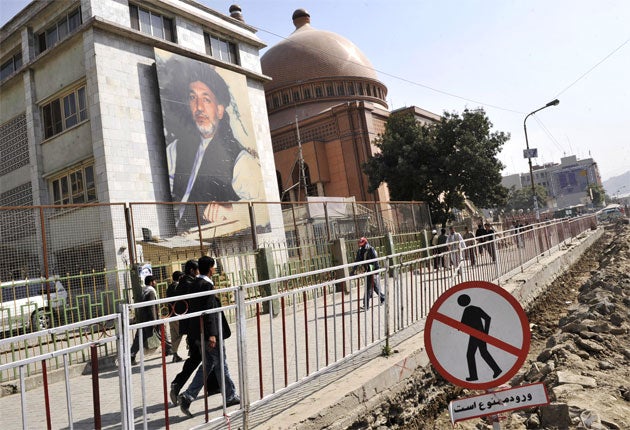Afghan run-off may force US hand on troops
Obama ponders reinforcements as Kabul authorities face struggle to ensure fair vote

The White House signalled last night that Hamid Karzai's decision to accept a run-off vote in Afghanistan could expedite a verdict on whether to increase US troop numbers there.
But as Barack Obama's spokesman, Robert Gibbs, told reporters that it was "certainly possible" the crucial answer on troop levels would come before the November ballot, election experts in Kabul warned too little is being done to ensure the run-off is any more credible than the first, fraud-ridden round.
Separately, US officials emphasised that a power-sharing agreement remained a strong possibility as a way of resolving the crisis without a return to the ballot box. In an NBC TV interview last night the President appeared to acknowledge that the situation remains fluid. "I think we're still... finding out how this whole process in Afghanistan is going to unfold," he said.
Despite a vast logistical effort across the country, led by the Independent Electoral Commission (IEC), to transport millions of fresh ballot papers, boxes and indelible ink, observers issued a damning verdict on the chances of a fair election the second time around.
"The worrying thing in this election is okay, we knew fraud had been committed. You had all these fraud mitigation policies drafted by the IEC – and they didn't follow them," said one Western election official. "What ... are they going to do to mitigate that fraud? I really don't know. I don't have a clue."
Mr Karzai's reluctant acceptance that a run-off was inevitable came after a UN-backed commission found that nearly one-third of his votes were fraudulent, depressing his numbers to just below the required 50 per cent. Had he resisted – and he was a hair's breadth from doing so – chaos could have ensued. But the new vote will not solve all of Afghanistan's electoral problems. Continuing scepticism about the prospects of a fair ballot has done little to bolster public confidence in the US mission in Afghanistan. An ABC-Washington Post poll yesterday showed the US divided over whether Mr Obama should accede to his commanders' request for more troops. And a large majority said they did not believe he had a clear plan for the war. A new vote would at least provide an American administration desperate for good news from Kabul with some evidence of progress.
The signs so far, however, are that a trouble-free re-run could be a tall order. The UN confirmed yesterday that it would fire 200 of the 380 district election chiefs in an effort to reduce fraud. But a shake-up of the leadership a fortnight before voting has the potential to be a political and managerial nightmare.
The IEC must rehire part-time staff to man polling centres, passing over any who were complicit in the vote rigging or failed to follow procedures the first time. Observers need to be mustered. And Afghan and international forces must mobilise troops to defend polling centres from Taliban attack. The UN has set aside more than $20m (£12m) to support the poll.
"They said they would be looking into staffing problems but of course they're not going to be able to do that in the next two weeks," the Western election official said.
Another election official said that the IEC had to be more accountable. "The meetings of the IEC need to be open and transparent," said Ahmad Nader Nadery, head of the Free and Fair Election Foundation of Afghanistan. "In the past election... they were not."
In an attempt to limit the impact of corruption, the number of polling stations – the individual booths at each polling centre – will be slashed from 23,000 to 16,000. The aim is to eliminate those where wholesale ballot stuffing took place. A UN spokesman said this would not reduce voting. "If a polling station returned mainly illegitimate papers, we're not disenfranchising voters, we're disenfranchising people who tried to cheat," said Aleem Siddique.
Rumours of a power-sharing deal have swirled around Kabul. They were given further credence last night by an Associated Press report that a US defence official had said the two governments were continuing to discuss that possibility. But Mr Karzai has said emphatically that he would prefer to beat the opposition candidate, Abdullah Abdullah, in a run-off than swallow a compromise. "He wants to go to a second round," said Ahmed Wali Karzai, the President's half-brother.
For his part, Mr Abdullah said he would only take part in the run-off if certain conditions were met to mitigate cheating. He told reporters that "in order to prepare the ground for transparency and fairness of the elections we have certain recommendations, suggestions as well as conditions that... we will come up with soon".
He also said "certain sad realities" made it impossible to stop the Taliban from intimidating voters. Although both candidates claim more voters than last time will turn out the reality is that there is little appetite for more polling. Turnout estimates were as low as 5 per cent for some areas hit particularly hard by the insurgency last time. In Kandahar City, the streets were deserted at midday and the Taliban hanged two people who had braved the rockets and gunfire to get to polling centres, as well as cutting the ink-stained fingers off others.
Subscribe to Independent Premium to bookmark this article
Want to bookmark your favourite articles and stories to read or reference later? Start your Independent Premium subscription today.

Join our commenting forum
Join thought-provoking conversations, follow other Independent readers and see their replies